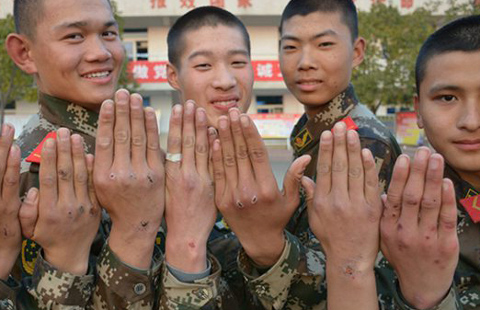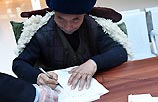Brazil levies antidumping against China
Updated: 2015-01-05 04:45
By PAUL WELITZKIN in New York(China Daily Latin America)
|
||||||||
An economic downturn has the Brazilian government turning to anti-dumping measures against China and other countries, according to analysts.
Last month the Brazilian Foreign Trade Chamber made antidumping charges levied on float glass imports from China and five other countries permanent. The duties were also placed on imports from the United States, Saudi Arabia, Egypt, the United Arab Emirates and Mexico. Brazil's Secex foreign trade bureau also imposed antidumping penalties on boron-added steel plate from China and Ukraine in December.
Last fall, BrazilianPresident Dilma Rousseff narrowly won re-election amid a struggling economy.The country has been battling high inflation and a sharp decline in private investment. The downturn in commodity prices has hit Brazil hard. A good example is iron ore where the price fell 40 percent in 2014 due to new capacity from Australian mining companies and a slowdown in China reducing demand.
All of this has increased the government's interest in antidumping measures, according to Christopher Cloutier, a partner in the King & Spalding law firm's international trade practice in Washington and a former member of the US embassy staff in China.
He has taken part frequently on behalf of the US in Chinese government trade proceedings and in negotiations with the Chinese government.
"One legal requirement for the imposition of antidumping duties is that the competing domestic industry must be suffering injury, and it's much easier to show injury during an economic downturn," he told China Daily in an e-mail.
China became Brazil's biggest trading partner in 2009 when it overtook the US. "The trading relationship between the two countries is complicated and unbalanced in terms of the nature of the goods being traded. While Brazil primarily exports commodities to China, such as iron ore, soybeans and oil, China is increasingly exporting high value-added manufactured and high-tech goods to Brazil. This imbalance has skyrocketed over the last 13 years," said Nathalie Hoffman, founder and CEO of Brazil Business Link in Marina del Rey, California.
His firm provides consulting and business development services to companies seeking to enter or expand operations in Brazil.
Hoffman noted that a change in the character of the Chinese imports is raising concerns in Brazil.
"China competes head-to-head with Brazil in certain Latin American export markets, with China taking market share away from the Brazilians. Furthermore, Brazil used to run a trade surplus with China. But now that iron ore prices have lost about 40 percent of their value, Brazil is now running a trading deficit," she said.
Cloutier said trade is increasing, but from the perspective of many in Brazil, it's not balanced trade. "Brazil provides raw materials to China that are then processed in Chinese factories, incorporated into higher value-added products, and then shipped from China to export markets including Brazil," Cloutier explained.
"In 1996, about 26 percent of Brazilian exports to China were of primary commodities, but now more than half of Brazilian exports to China are of primary products. Conversely, in 1996 about one quarter of Chinese exports to Brazil was of high-technology products but now that value is above one half."
Cloutier said the trend is clearly for an increasing number of Brazilian antidumping investigations targeting China.
"In 2013, Brazil initiated a total of 38 antidumping investigations, 10 of which - about one quarter - targeted China. In 2014, Brazil reported to the World Trade Organization that it initiated 66 antidumping investigations. China was targeted in 16 of these new investigations, still about a quarter of all cases," he said.
Although China accounts for the highest proportion of cases, it's hardly the only target. In 2014, for example, imports from the United States were targeted in six antidumping investigations initiated by Brazil and in 2013 South Korea was the target in five cases, he said.
paulwelitzkin@chinadailyusa.com

 Harbin gets ready for ice and snow festival
Harbin gets ready for ice and snow festival
 Shanghai, Nanjing heat up just before predicted cold
Shanghai, Nanjing heat up just before predicted cold
 Police frontier force conducts military exercise
Police frontier force conducts military exercise
 Carpenter creates e-vehicle with wood in Shenyang
Carpenter creates e-vehicle with wood in Shenyang
 Thousands gather in NYC for funeral for slain police officer
Thousands gather in NYC for funeral for slain police officer
 Scars of honour
Scars of honour
 Mall turns shops into rail carriages
Mall turns shops into rail carriages
 Martial arts conference to be held in Georgia
Martial arts conference to be held in Georgia
Most Viewed
Editor's Picks

|

|

|

|

|

|
Today's Top News
New York mourns Wenjian Liu
What's in store for the stock market in 2015?
Alleged serial killer stands trial in North China
College uses Shanghai stampede to justify its policies
China braces for slower but better growth in 2015
New York mourns slain Chinese-American police officer
Chinese VP Li attends Rousseff's inaugural
Brazil uses antidumping measures against China
US Weekly

|

|







